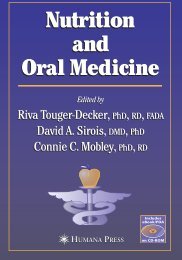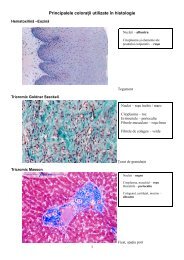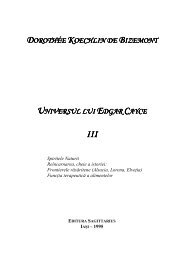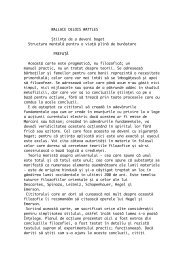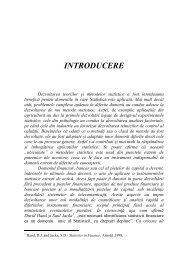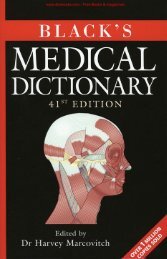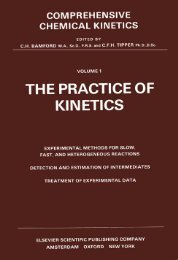- Page 2 and 3:
Food and NutritionDon RossOxford Bo
- Page 4 and 5:
Contentsl. Diet and Health 12. Nutr
- Page 6 and 7:
Chapter 1Diet and HealthINTRODUCTIO
- Page 8 and 9:
Diet and Health 3Prevention Trial p
- Page 10 and 11:
Diet and Health 5recognized and has
- Page 12 and 13:
Diet and Health 7elements, as well
- Page 14 and 15: Diet and Health 9more visible in re
- Page 16 and 17: Diet and Health 11drastically reduc
- Page 18 and 19: Diet and HealthAloe veraGreenlipped
- Page 20 and 21: Diet and Health 15bind tetracycline
- Page 22 and 23: Diet and Health 17even a well-balan
- Page 24 and 25: Diet and Health 19sugar, caffeine,
- Page 26 and 27: Diet and Health 21commonly used rat
- Page 28 and 29: Diet and Health 23However many stud
- Page 30 and 31: Diet and Health 25day, such as offi
- Page 32 and 33: Diet and Health 27• Nutritional l
- Page 34 and 35: Diet and Health 29Sweetenersit appe
- Page 36 and 37: Diet and Health 31servings). Two ba
- Page 38 and 39: Diet and Health 33to validate and s
- Page 40 and 41: Diet and Health 35Food Labeling Leg
- Page 42 and 43: Diet and Health 37more reduction of
- Page 44 and 45: Diet and Health 39is unlikely to ac
- Page 46 and 47: Diet and Health 41: one who abstain
- Page 48 and 49: Diet and Health 43Unlike apes, thei
- Page 50 and 51: Diet and Health 45still the myth li
- Page 52 and 53: Diet and Health479 -12 MonthsAt thi
- Page 54 and 55: Diet and Health 49eat or purchase f
- Page 56 and 57: Chapter 2NutrientsNutrients are sub
- Page 58 and 59: Nutrients 53although elemental diat
- Page 60 and 61: NutrientsDisaccharidesAre sugars fo
- Page 62 and 63: Nutrients 57materials called lipids
- Page 66 and 67: Nutrients 61weakness, low blood sug
- Page 68 and 69: Nutrients 63Vitamin 8 5(Pantothenic
- Page 70 and 71: Nutrients 65Vitamin C (Ascorbic Aci
- Page 72 and 73: Nutrients 67CholineCholine is a cof
- Page 74 and 75: Nutrients 691170, ,Kelp: 1093, (Mg
- Page 76 and 77: Nutrients 71reasons have habitually
- Page 78 and 79: Nutrients 73to nickel compounds hav
- Page 80 and 81: Nutrients 75Because cow's milk and
- Page 82 and 83: Nutrients 77supplements or food add
- Page 84 and 85: Nutrients 79water intake in 1945 by
- Page 86 and 87: Nutrients 81Sources and Requirement
- Page 88 and 89: Chapter 3Function of FoodBody Compo
- Page 90 and 91: Function of Food 85Metabolism of so
- Page 92 and 93: Function of Food 87process is analo
- Page 94 and 95: Function of FoodTable. Average Dail
- Page 96 and 97: Function of Food 91diet are mainly
- Page 98 and 99: Function of Food 93diets may be an
- Page 100 and 101: Function of Food 95beneath the skin
- Page 102 and 103: Function of Food 97are nutritionall
- Page 104 and 105: Function of FoodTable. Protein cont
- Page 106 and 107: Function of Food 101of the constitu
- Page 108 and 109: Function of Food 103Whereas a litre
- Page 110 and 111: Function of Food 105world, both Sou
- Page 112 and 113: Function of Food 107with need. Mens
- Page 114 and 115:
Function of Food 109pregnancy may l
- Page 116 and 117:
Function of Food 111health problem
- Page 118 and 119:
Function of FoodVitaminsVitamins ar
- Page 120 and 121:
Function of Food 115. $ince pure cr
- Page 122 and 123:
Function of Food 117per cent more,
- Page 124 and 125:
Function of Food 119DeficiencyDefic
- Page 126 and 127:
Function of Food 121Starchy roots,
- Page 128 and 129:
Function of Food 123pregnant women
- Page 130 and 131:
Function of FoodDietary SourcesThe
- Page 132 and 133:
Function of Food 127of vitamin D, a
- Page 134 and 135:
Function of Food 129bacterial synth
- Page 136 and 137:
Function of FoodOne portion of meat
- Page 138 and 139:
Digestion and Absorption 133stomach
- Page 140 and 141:
Digestion and Absorption 135small a
- Page 142 and 143:
Food Safety and Preparation 137this
- Page 144 and 145:
Food Safety and Preparation 139a su
- Page 146 and 147:
Food Safety and Preparation 141refr
- Page 148 and 149:
Nutrition Disorder Related to Food
- Page 150 and 151:
Nutrition Disorder Related to Food
- Page 152 and 153:
Nutrition Disorder Related to Food
- Page 154 and 155:
Nutrition Disorder Related to Food
- Page 156 and 157:
Nutrition Disorder Related to Food
- Page 158 and 159:
Nutrition Disorder Related to Food
- Page 160 and 161:
Nutrition Disorder Related to Food
- Page 162 and 163:
Nutrition Disorder Related to Food
- Page 164 and 165:
Nutrition Disorder Related to Food
- Page 166 and 167:
Nutrition Disorder Related to Food
- Page 168 and 169:
Chapter 7Meal PlanningBalanced diet
- Page 170 and 171:
Meal PlanningAdvantages of Breast M
- Page 172 and 173:
Meal Planning 167• RDIs for energ
- Page 174 and 175:
Meal PlanningNutrients• Energy gi
- Page 176 and 177:
Chapter 8Dietary GuidelinesWhether
- Page 178 and 179:
Dietary Guidelines 173nutritional c
- Page 180 and 181:
Nutrition for Pregnant Women 175fol
- Page 182 and 183:
Chapter 10Infant NutritionTWO MONTH
- Page 184 and 185:
Infant Nutrition 179vegetables with
- Page 186 and 187:
Chapter 11Young Children and Toddle
- Page 188 and 189:
Young Children and Toddlers 183Thes
- Page 190 and 191:
Young Children and Toddlers 185baby
- Page 192 and 193:
Chapter 12School Age ChildrenChild'
- Page 194 and 195:
School Age Children 189• Choose s
- Page 196 and 197:
School Age Children 191provide vita
- Page 198 and 199:
Chapter 13Adolescent NutritionTo de
- Page 200 and 201:
Adolescent Nutrition 195One of the
- Page 202 and 203:
Adult Nutrition 197component are no
- Page 204 and 205:
Chapter 15People living on low Inco
- Page 206 and 207:
People Living on Low Income 201to t
- Page 208 and 209:
Chapter 16Nutrition for Senior Citi
- Page 210 and 211:
Nutrition for Senior Citizens 205
- Page 212 and 213:
Vegetarian Diet 207Tips for Vegetar
- Page 214 and 215:
Food Production and Processing 209s
- Page 216 and 217:
Food Production and Processing 211N
- Page 218 and 219:
Food Production and Processing 213-
- Page 220 and 221:
Food Production and Processing 215H
- Page 222 and 223:
Wheat 217in -1 % of Indo-European p
- Page 224 and 225:
Chapter 20Fats and OilsVegetable fa
- Page 226 and 227:
Fats and Oils 221oil (a mixture of
- Page 228 and 229:
Fats and Oils 223oils. Lightly hydr
- Page 230 and 231:
SugarDiabetesDiabetes, a disease th
- Page 232 and 233:
Sugar 227Europe exports excess prod
- Page 234 and 235:
Sugar 229although proper handling c
- Page 236 and 237:
MilkPasteurizationPasteurization is
- Page 238 and 239:
Milk 233seals ,and whales can conta
- Page 240 and 241:
Cheese 235s~pilraijngthe milk into
- Page 242 and 243:
Cheese 237increased risk of heart d
- Page 244 and 245:
Dried Fruits and Vegetables vegetab
- Page 246 and 247:
Dried Fruits and Vegetables 241can
- Page 248 and 249:
Dried Fruits and Vegetables 243of o
- Page 250:
C1:Jutneys, Pickles, Salted Vegetab
- Page 253 and 254:
248 Chutneys, Pickles, Salted Veget
- Page 255 and 256:
250 Chutneys, Pickles, Salted Veget
- Page 257 and 258:
Chapter 26Food Add itiveFood additi
- Page 259 and 260:
254 Food Additiveis referred to as
- Page 261 and 262:
256 Food AdditiveAdditives Approved
- Page 263 and 264:
258 Food Packagingtamper resistance
- Page 265 and 266:
Chapter 28Principle of CookingTo co
- Page 267 and 268:
Chapter 29Food SpoilageMost natural
- Page 269 and 270:
264 Food SpoilageFig. Watery Soft R
- Page 271 and 272:
266 . Food Spoilagethe action of en
- Page 273 and 274:
268 Food PreservationDrying• Low
- Page 275 and 276:
270 Food Preservationrecipes for ce
- Page 277 and 278:
272 Food Preservationplace. Radiati
- Page 279 and 280:
Chapter 31Cooking Methods'Food prep
- Page 281 and 282:
276MeritsCooking Methods• Less ch
- Page 283 and 284:
278Demerits• Food can be scorched
- Page 285 and 286:
280 Cooking Methods• Frying lends
- Page 287 and 288:
282 Cooking Methods• Cost effecti
- Page 289 and 290:
28432,33,34, 36, 37, 38, 39, 49,57,
- Page 291:
286IndexPlenty 26, 31, 56, 100, 129







